Blood, sweat and steel: Life in and out of the steel works
- Published
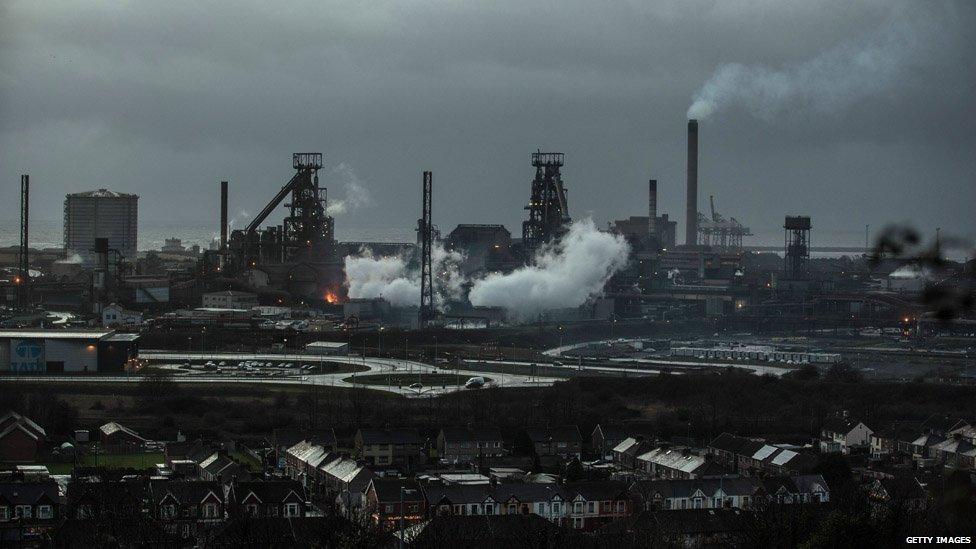
The steel works could easily have been for me.
Like it was for many who grew up in the town of Port Talbot, the dystopian mesh of pipes, turrets, chimneys and constant smoke was considered a viable career prospect and, for some, a certainty - a safe bet.
One particular memory that stands out is of a former comprehensive school teacher, who, when I was 14 or 15, asked what type of career I was considering.
Growing up in the 1980s and early 90s it was hard to avoid things like television, music, and video games. On top of that I was an avid reader and film junkie, so I was being honest when I said I would like to work in the media, possibly in writing or film.
The teacher, who shall remain nameless, told me while it was nice to have dreams, maybe I should consider something more realistic, like a trade or industry.
He meant the steel works.
Call it single-mindedness, but I knew a life in the steel works was not for me.
Art and English were the subjects I enjoyed most at school. I was good at them. True, they were the only things I was good at, but I thought it important to play to my strengths.
And I did.
I was the first in my family to go to university, an opportunity afforded to me by the hard work of my parents.
I say hard because that is what it was.
We were by no means poor, but we were not well-off either, and the introduction of student tuition fees in 1998 did not make things any easier.
My mother was a civil servant and my father, like almost every other man in my family, worked in the steel works.

Some of my earliest memories of my father are of him coming home in the early, still dark hours of the morning, having worked yet another exhausting 12-hour night shift.
And while he always had time for my mother, my sister and myself before we went to work and school, the tiredness in his eyes convinced me I wanted nothing to do with overnight shift work.
But for my father, and others like him in the late 70s and early 80s, shift work and sweating it out for 12 hours in a hot, smoke-filled and - yes - dangerous steel mill was the norm.
And so it was with the works. For anyone who has grown up or lived in Port Talbot for a significant amount of time, the works are nothing out of the ordinary.
Those driving by on the M4, or just passing through on their way to Bridgend or Neath, are prone to think it a monstrosity - an ugly, nightmarish blot on the south Wales horizon.
But, for those living there, the works are part of the furniture, a towering constant that can be seen from almost every other point in the town.
And for my father it has been just that - a constant.
Like many in the town, for him the steel works meant a job for life. But, as the current workforce recently discovered, nothing is certain and their livelihoods, once again, are in danger.
In January it was announced 750 jobs were to go at the Port Talbot plant and 300 more elsewhere. Workers have discovered over the course of this week exactly who will be leaving.
It is another sobering blow to an already struggling industry, and one which my father has seen before.
Winning an engineering apprenticeship after he left school, he first started work in the Port Talbot plant when he was 17.
Now 56, and retired, he remembers what it was like on his first day.
The Port Talbot works and its future are discussed by three generations of the same family who worked there

David Burgess
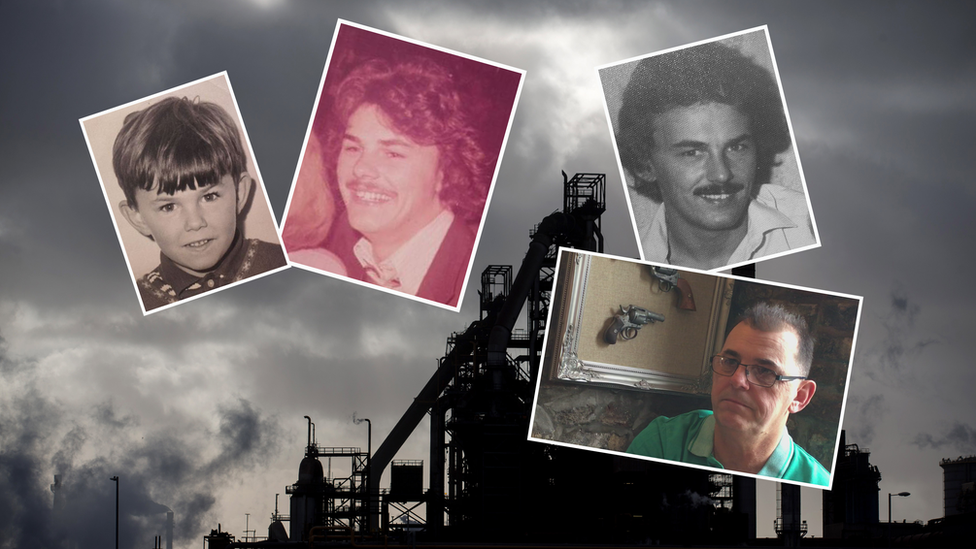
It was 1976 when, at 17 years old, David Burgess first stepped foot into Port Talbot steel works.
"First day, I started as an apprentice," he tells me, and the "first couple of weeks were inductions, learning the safety aspects, being told what to expect.
"We didn't see much of the plant for the first 18 months to two years."
It was common practice then, he explains, for people his age to take up a trade.
"Apprenticeships were probably the main thing for school-leavers at the time unless you went to college, but during that era most people went into apprenticeships after school."
In those days the steel works were overseen by British Steel, and there were "probably 11,000 to 12,000 people working there at the time," he remembers.
But then, as now, the threat of redundancy and unemployment soon made itself known.

"We were just coming into the first Slimline (British Steel's restructuring of the workforce), so things started changing - there were massive job losses at the time," he says.
My father recalls how his apprenticeship lasted four years, from 1976 to 1980, "but for the first couple of years, because of Slimline, I was under threat of notice.
"We didn't know whether we would have a job after our apprenticeship, so it was pretty grim."
Not that it was all bad. There were good times too.
Chief among them was the role he played in a special project for Cardiff.
"When we were apprentices," he tells me, "we made the rugby posts in the training centre in Port Talbot for the old Cardiff Arms Park."
That would be good enough in itself but my father, along with his fellow apprentices, were taken to the ground to see the posts installed.
There they were given a tour before my father was given the honour of being the first person to kick a rugby ball over the new posts.
A feat later emulated by the likes of Welsh rugby greats Steve Fenwick and Paul Thorburn.
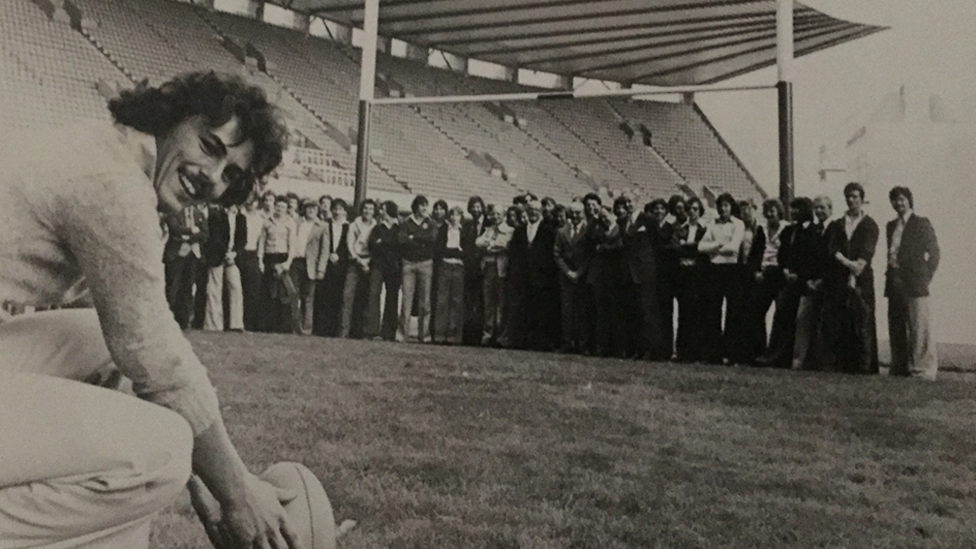
"I do have happy memories of the place," he says, though he is quick to add the threat of job cuts in his early days loomed like a long shadow over a very uncertain future.
But, luckily, the threat abated and job security was on the cards.
"Once we got over Slimline and got established," he explains, "then you looked at it as a job for life."
And it was, for him and many more in the town.
But while livelihoods were safe and secure, the threat to their actual lives was something that never went away and was something they were warned about early on.
'Dangerous place'
The steel works is "a very dangerous place," he says. "Huge machinery, molten metals, different gasses. But safety is paramount and always has been.
"When we did our apprenticeship induction, we were told one in three or one in four of us would lose a part of the body - which was the nature of that time."
Something my father would find out for himself.
"I was working, taking a brake assembly off a crane," he remembers, "bringing it down off the crane, putting it on the floor. I started to work on it and it toppled over. A loose brake shoe flipped up, clipped me and took the top of my finger straight off."
Not that my father is bitter.
"It [health and safety] is a bit better now," he says, "but accidents do happen and people do get injured."
But, like many in Port Talbot, my father's concerns are not with what happened in the past but with what is happening now.
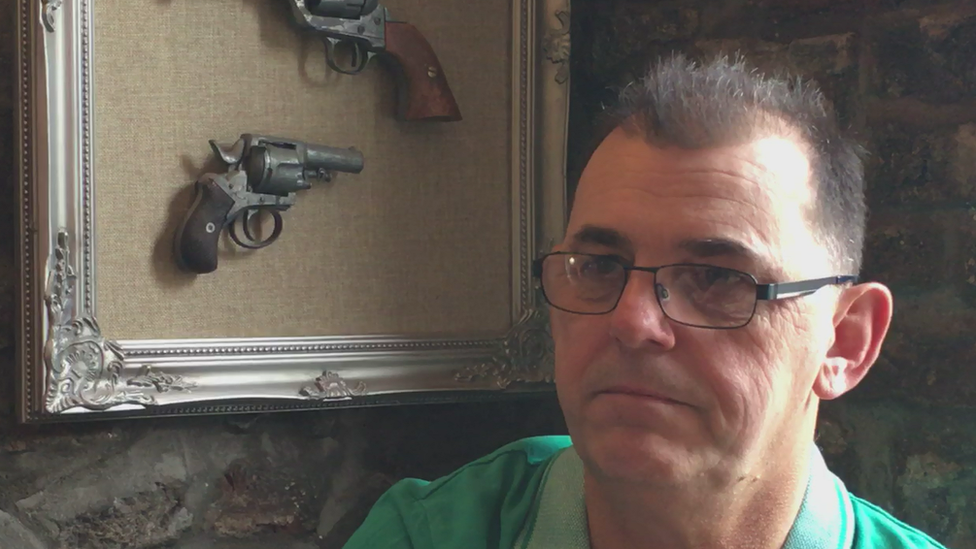
"At this moment in time," he says, "with the recent job losses that have been announced, when these job cuts have been finalised and people have lost their jobs or been made redundant, or taken voluntary [retirement], the next 12 months are going to be very sticky [for people], and to see what Tata decide to do with Port Talbot."
Everyone seems to be in agreement - the next 12 months are a crucial time for those who rely on the steel works for their income and their security.
With the latest round of job cuts announced, my father is keen to stress his confidence in the workforce of the town.
"The workforce of Port Talbot is highly skilled," he says. "They will work their socks off to make a success of that place.
"But cheap, imported steel is being dumped, and the cost of energy to run the steel works is phenomenal.
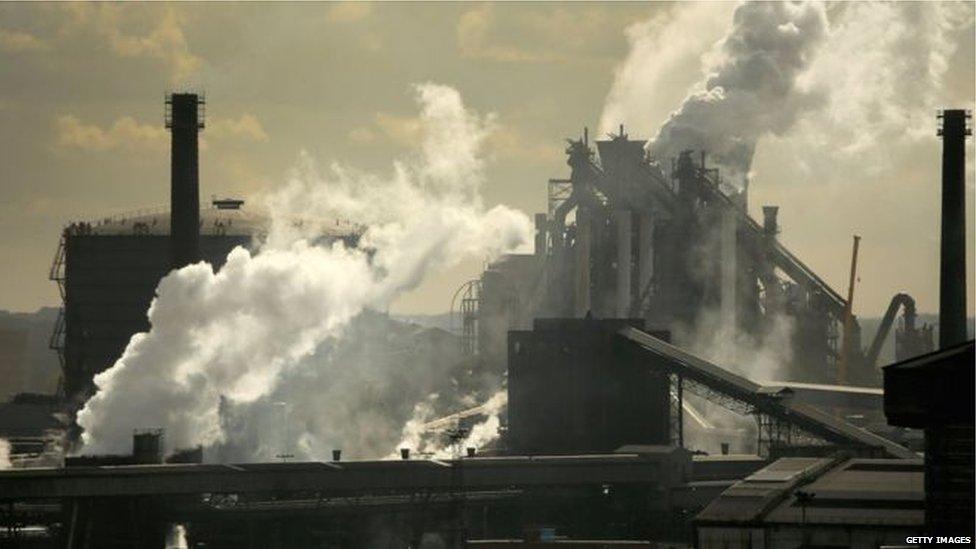
"Without some help from the government, or funds provided so they can build their own power station and be self-sufficient, then the steel works and the industry in south Wales cannot sustain itself for much longer."
Looking further into the future, he is hopeful the steel works will "find a way of staying open", but adds it will be a "death knell" for south Wales if it closes.
"To me, this is the last part big part of British manufacturing, there's nothing else.
"It's not only the steel works that will have a huge impact on people's lives - it's the small subsidiary engineering firms, suppliers to the works that are going to lose their trade.
"This will have a big, big impact on south Wales."

Harry Thomas
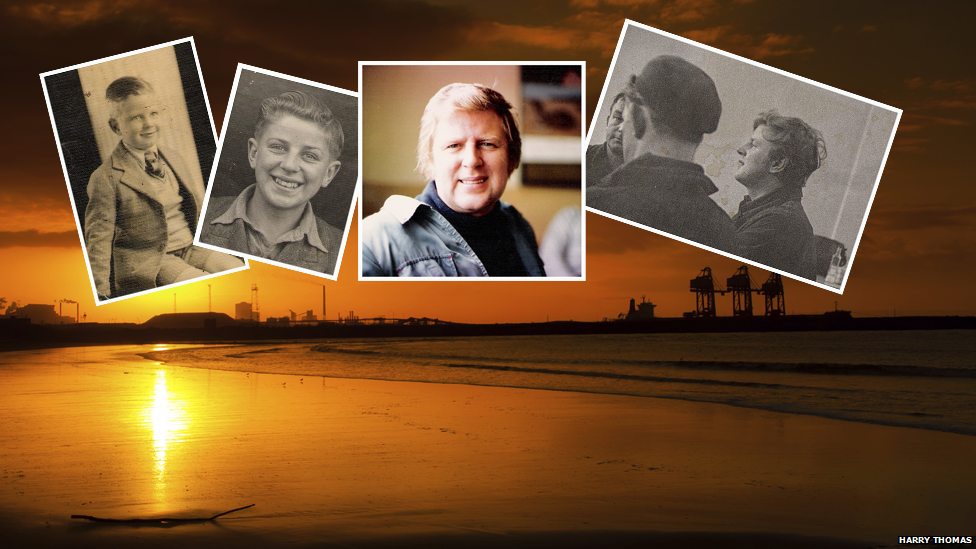
My grandfather, Harry Thomas, turned 80 years old last year. Port Talbot has been the only home he has ever known and he still lives in the same house he was born in.
Growing up he witnessed the town and surrounding areas change time and time again, keeping pace with the industrial age and expanding in size and reach year on year.
During his childhood he watched as sand dunes, fields and farmland made way for roads, motorways, factories and retail.
He remembers it all and he can recall, when he was just a boy, looking out from the town's Aberavon Beach and seeing the German Luftwaffe bombing the nearby city of Swansea, the smoke and flames rising up from the bay.
Not many years later, despite the end of World War Two, young men from all over Britain were still subject to national service.
And so it was for my grandfather who, at 18, found himself in Army fatigues, being shipped off to Egypt for two years to help guard the Suez Canal.
Two years beneath a punishing Egyptian sun can seem like a long time but, after his service was completed, it was time to return home.
But coming home meant you had to make a living.
"In 1956 I'd just come out of the Army, so I'd be 21," he says.
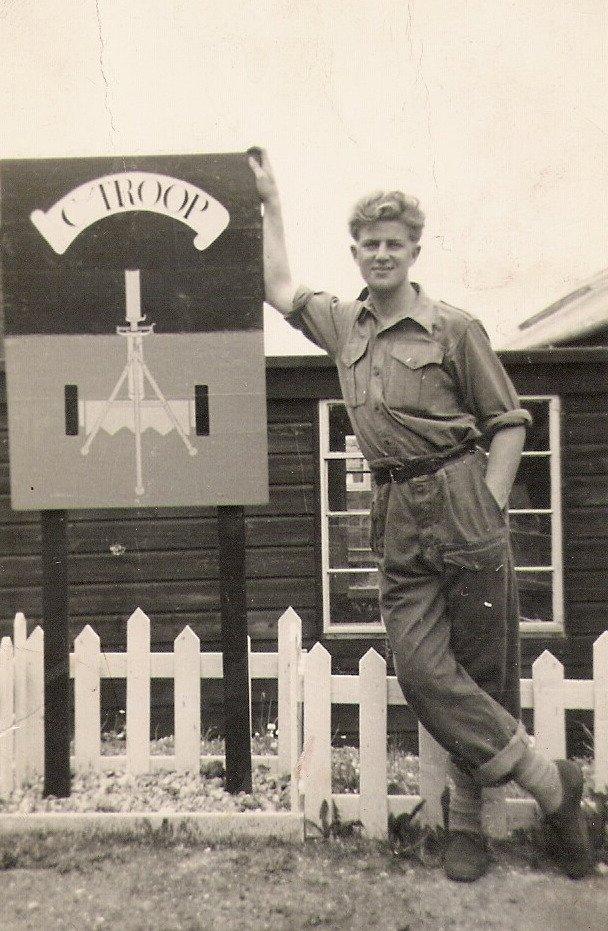
"Everything rolled around the steel works. So if you wanted a job you went there."
He was not alone in his thinking, he recalls.
"A lot of boys come out [of the Army], like myself, and you went to the steel works.
"You were more or less guaranteed a job - there was plenty of work everywhere."
Thinking back to his first day, he remembers how men were picked for where they worked.
"So many boys there you knew - it was just like a pool of men - and the foreman would come along and say 'we want you in that department' or 'so many in that department', and you'd stay there."
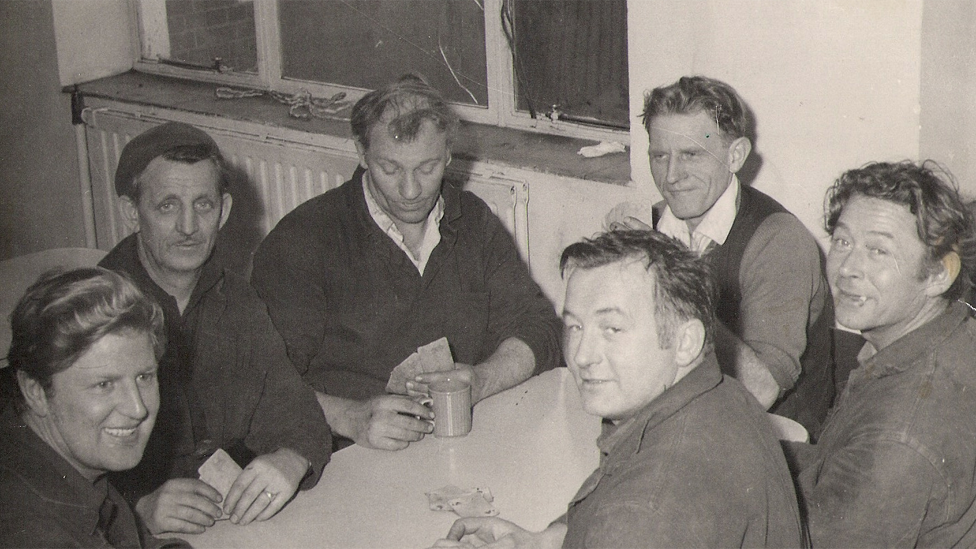
Despite an abundance of work there were also a lot of people in need of it, and not everyone could be guaranteed employment every day.
"Sometimes, perhaps, you went there on a Monday and they'd keep you there until Friday," he says. "But the rest they didn't want would go back in the pool."
Not that my grandfather struggled when it came to finding work. Initially working in the blast furnace, it was not that long before he found himself operating cranes down by the docks on Aberavon Beach.
"The jobs we were doing were on the engineering side," he recalls, "but what they wanted were trainee crane drivers - so we thought we'd have a go at that.
'Plain sailing'
From there, he tells me, it was more or less plain sailing.
"Once we'd passed our test, well, that was it. It was a promotion line all the way then."
Not that sitting high up in a crane was considered a safe job - the threat of physical danger never went away. Whether working in the blast furnace or operating the cranes in the harbour, safety was always paramount.
"Trouble wherever you go," he says of his time there. "So many moving parts, belts in the stock yard - the cranes themselves. There's danger and you've got to beware."
And when it came to the cranes, there were some who just could not do it.
"I admire these boys, some of who have gone up and said 'sorry, not for me'. But then there were others, like myself, who said 'I'll have a go'. But I do admire someone who says 'no, not for me'."
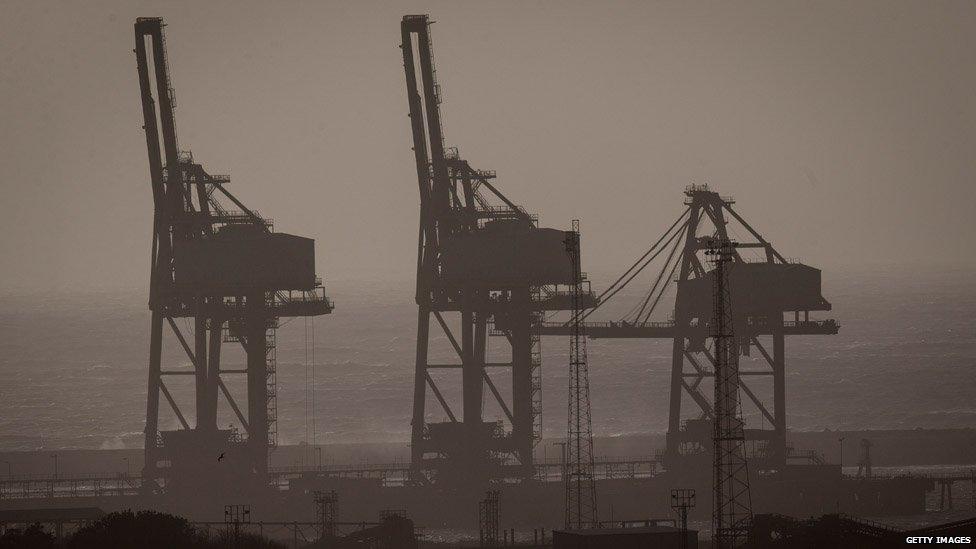
Luckily for my grandfather it was for him, and he enjoyed a career in the steel works that lasted 40 years until his retirement.
But he knows, as much as anyone, steel workers today cannot rely on that level of security when it comes to their employment and income.
The announcement in January that more jobs were to go have left many in the town fearing for their mortgages, their children's well-being and future security, for steady income, and even food on the table.
Jobs, like the town itself, he reminds me, were a lot different during his day.
'Jewel in the crown'
"Port Talbot then, well, everything was open - not like today, where everything is half shut.
"I know the cost of living has gone up, but things seemed a lot better then."
Asked why, my grandfather is quick to acknowledge the steel works as the town's life blood.
"No steel works, no Port Talbot," he says firmly. "It was the jewel in the crown."
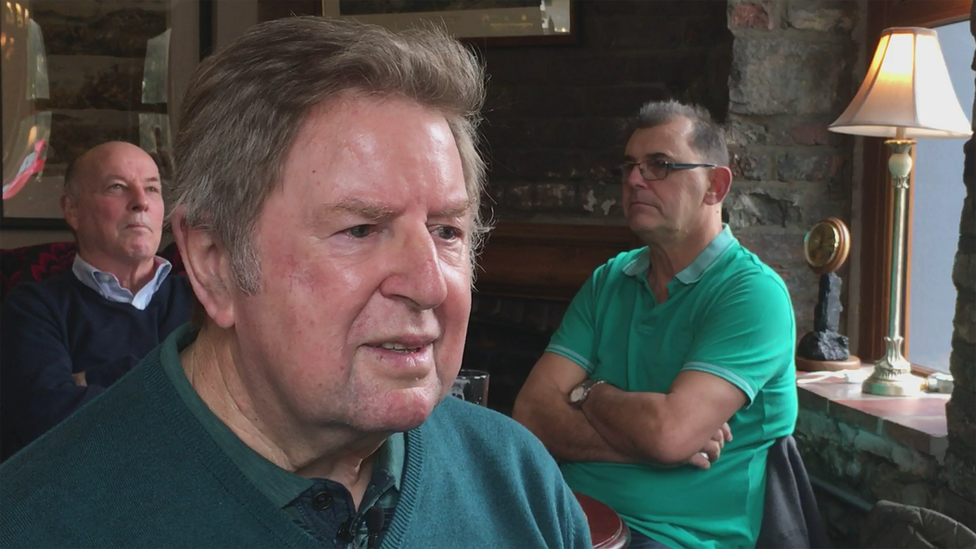
Nevertheless, and despite the latest threat, he continues to remain hopeful.
"At the moment it's looking rough," he says, "but there have always been disputes.
"I've always thought there's so much investment going on [in the works] they're not going to get rid of Port Talbot.
"They might prune it," he adds, "but they're not going to get rid of it."
I wonder if my grandfather's confidence is more a hopeful wish than the long-term reality the town is facing, but he is adamant in his stance that the works will survive.
"You're not [just] closing the steel works, you're closing Port Talbot.
"But I think, at the end of the day, they will be OK."
He realises times are difficult but notes the steel works is still going, and that its heart, no matter how black it might look from a distance, is still pumping life into the town he has spent his entire life in.
"They could turn around and say 'that's it'," he says finally, "but they haven't, so there could still be light at the end of the tunnel."

David Morley
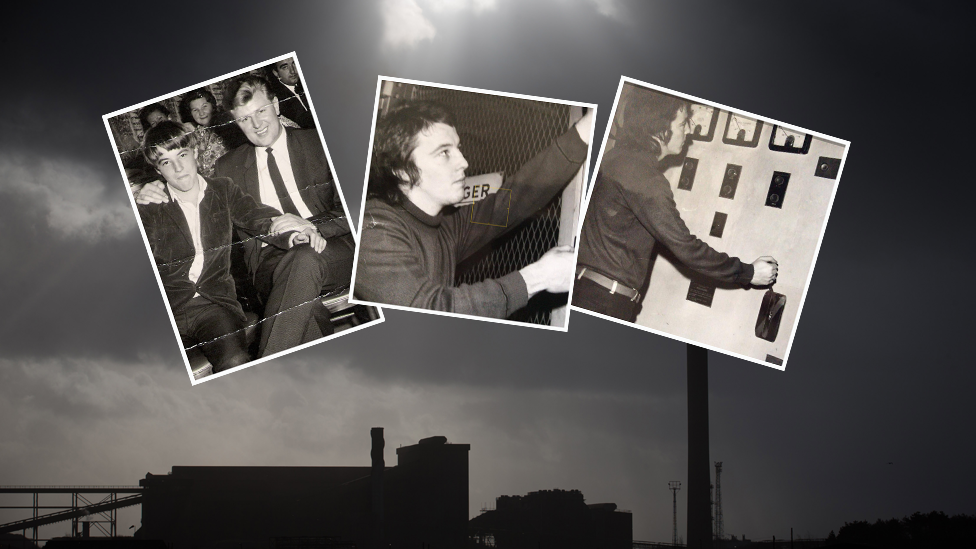
David Morley, 64 years old and retired, is my mother's uncle. In 1969 he was 18 years old and taking his first steps into Port Talbot steel works. Looking back now, he remembers his first day was not the best.
"It was very traumatic," he says, "because you went into an environment which was pretty harsh - at the time.
"I remember I had on a green suit and I was walking up the cast house floor when I saw my brother-in-law [my grandfather] in the crane, and that eased me a bit."
Not that the steel works was the only option.
"You could get a job in there, practically anywhere in the works," he recalls, "but they were also building BP (oil refinery) in Llandarcy."
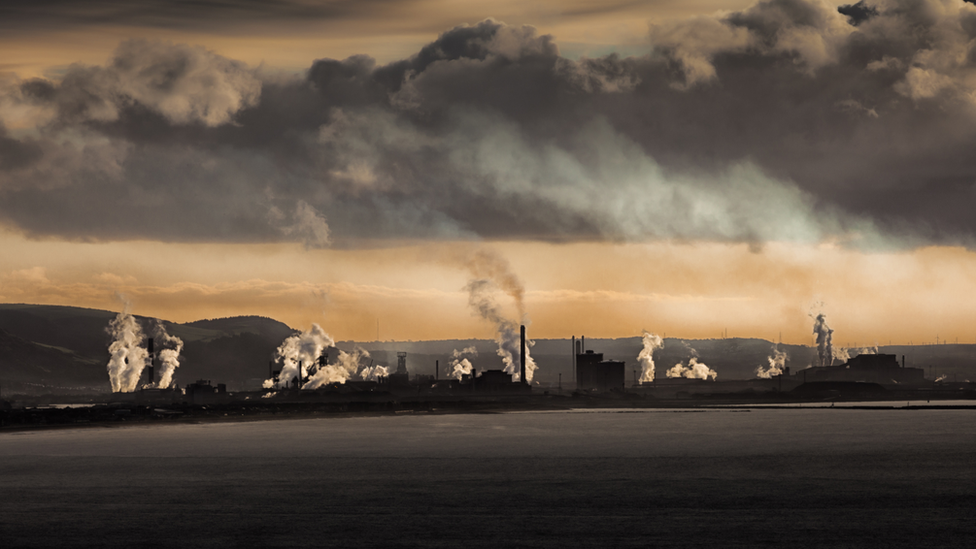
Both sites had the potential for a lifetime of employment and job security but, on this occasion, family made the final decision.
"It was a matter of one or the other but I decided on the steel works because my father had worked there, my family were working in there - that was the basic pull."
And from then on it only got better - with one exception.
"I started off labouring," my uncle remembers, "and then went to the furnace, which didn't take me long to realise I didn't want to do."
Asked why, he explains he didn't like the environment: "Too dirty, too hot."
Not just a job
Instead he opted for a job in the gas cleaning plant, which had its advantages in terms of career progression.
"The workforce in that part of the plant was old," he remembers, "so I knew it wouldn't take me long to work up to a higher job."
It was a bet that paid off as, after just two short years, he had secured the top job in that department.
And other roles would follow, proving a life in the steel works was not just a job but a career, if that was what you wanted.
Whether it was under British Steel, Corus or Tata ownership, being part of the Port Talbot plant's workforce seemed like the safest bet in town.
But as my uncle points out, and as my father and grandfather saw themselves, over the years that workforce changed.
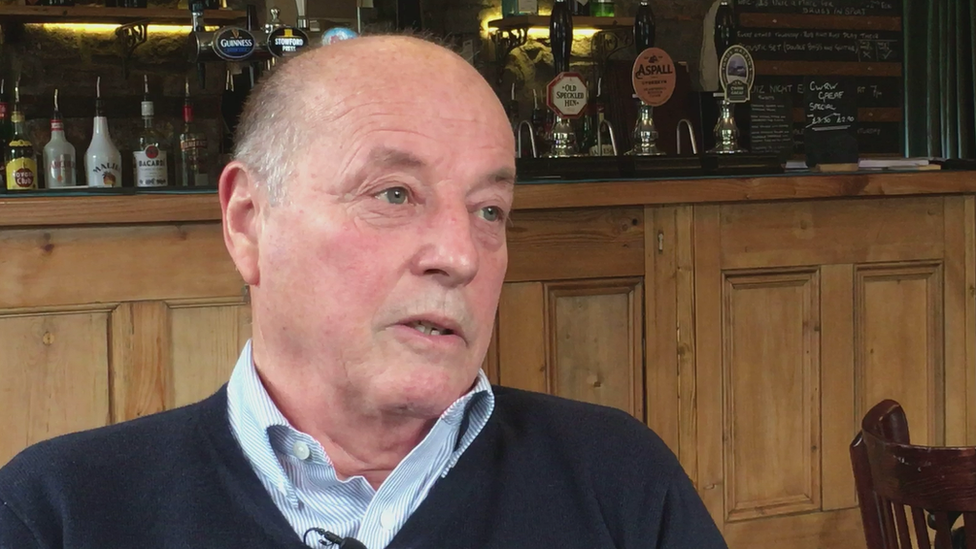
"There were about 19,000 when I started there and then they reduced," he says. "When the unions had the power in the 70s they didn't use what they had the right way - they used it for the wrong things."
Job losses and redundancies were not the only things ushering in change, though.
"Automation came in," he recalls, "which frightened a lot of people. People didn't like screens, didn't want them. A lot of people were really worried about it.
"There were quite a few who just didn't want to know, didn't want change."
Change, especially technological change, is inevitable, some would argue, and it would seem Port Talbot steel works is no more immune to it than any other industry.
"The workforce has changed dramatically," my uncle adds, "but for the better."
Asked about current owners Tata, he is quick to defend them and their management of the works.
"Tata, in fairness, have spent a lot of money in there. They want it to be successful, they don't want it to close."
But the threat of closure, no matter how far away the possibility might seem, is something on the minds of many in the town.
'Level playing field'
Asked what can be done, it seems there are no easy answers. But those who have worked there, like my uncle, say they know where to start.
"Tata want to build a power plant so [the works] can be self-sufficient. And they want a bit of help, but the government is not coming over with any help.
"It should be sustaining the steel industry. The mines have gone, the steel will go - [after that] I don't know what's there for youngsters.
"It's not just the steel works," he adds. "You thought the police was a job for life, the fire service was a job for life. There's no guarantee anything is safe now the way things have been cut."
Not that he thinks the fate of the steel works is sealed.
"I wouldn't say there's no future there because there can be a future - if the government can help them a little bit. That's all they're [Tata and the workers] asking for is a level playing field."
And if the government do not help?
"If they're on their own," he says, "then Tata are not going to sustain a £1m a day loss. So this [job announcement] might just be the start."
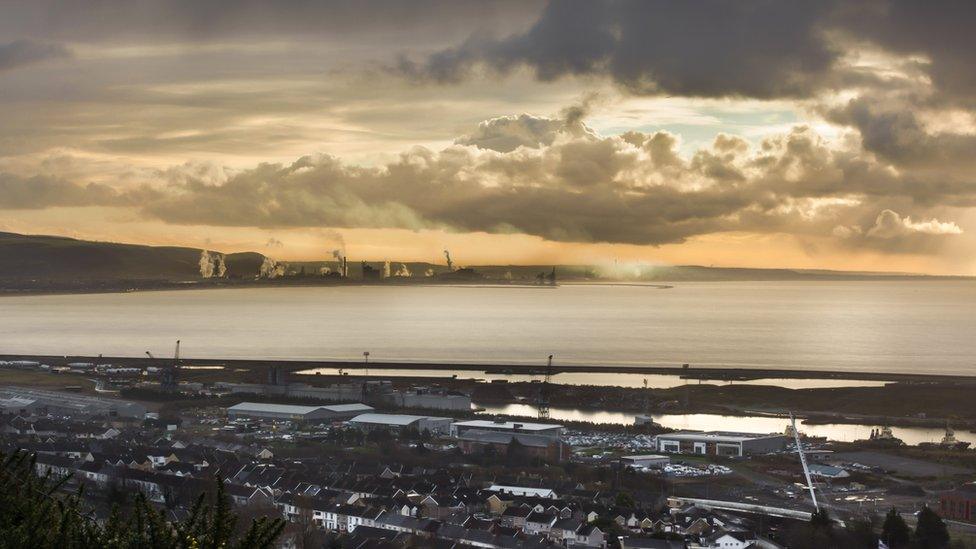
And if the steel works ever closes?
"It will be like other places where the mines have gone," he says gravely. "Children will move away - they're bound to look for work elsewhere.
"Personally, if I had children at that age I would encourage them to go abroad, the way things are going, this country's on the decline.
Asked what the people of Port Talbot will do without the works, without the lifeblood it supplies, he says: "People get by, they always do".
"I've been lucky," he adds, "I've always worked. My family's always worked. But I don't know how people manage when they're not working.
"It must be hard," he stresses, "especially if you want to work. If you want to work and you can't get work that's terrible."
'Massive impact'
Looking forward, he points out it is not just Port Talbot that will suffer should the steel works go the way of the mines.
Agreeing with others in my family, he says if the works were to close it would have a "massive impact" on south Wales.
"Not just on Port Talbot but on outlying communities as well," he says, "because people from everywhere are coming here - Neath, Maesteg, Porthcawl, not just this town."
Asked for a final thought, my uncle poses a question instead.
"If the government can get their act together, they can keep it [the steel works]," he says. "There's a lot of money there, investment still to be had.
"Why," he asks, "why can't they do it?"

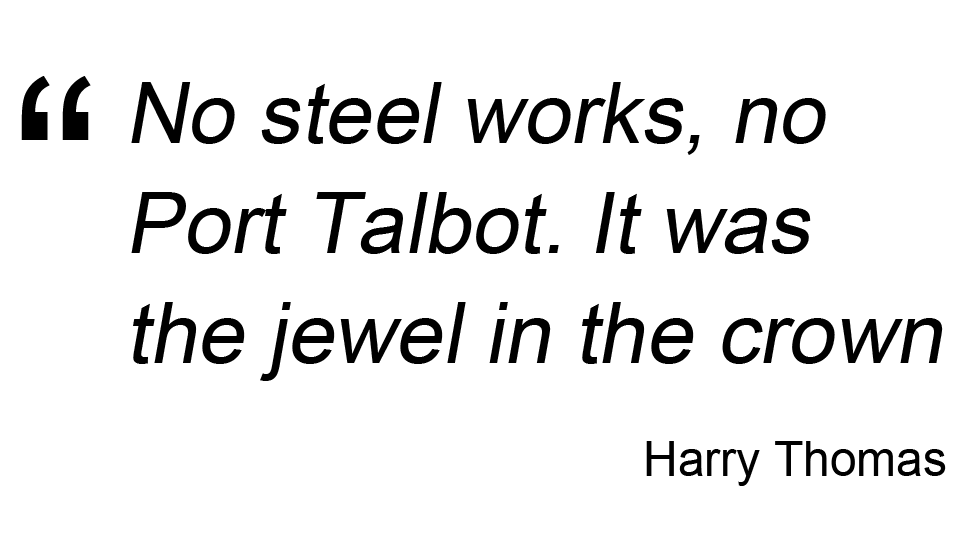
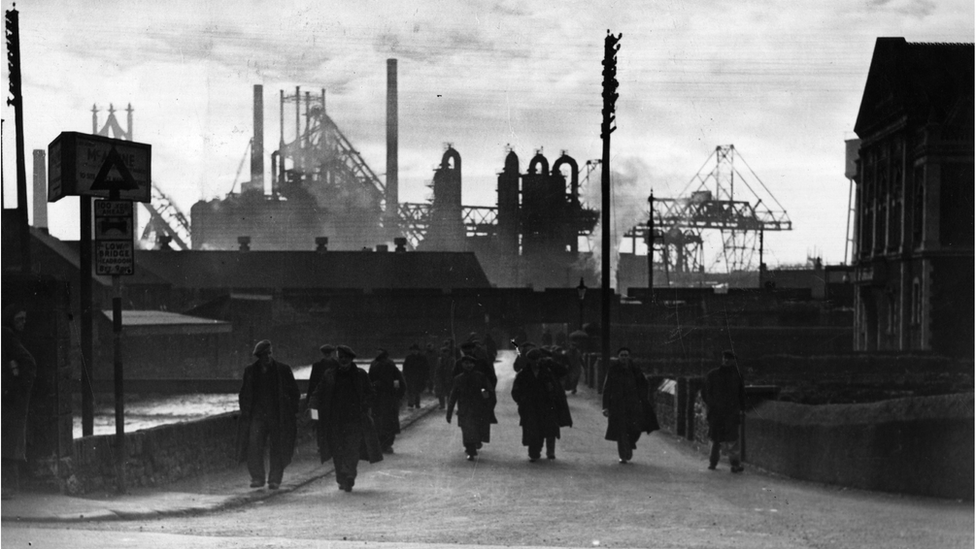
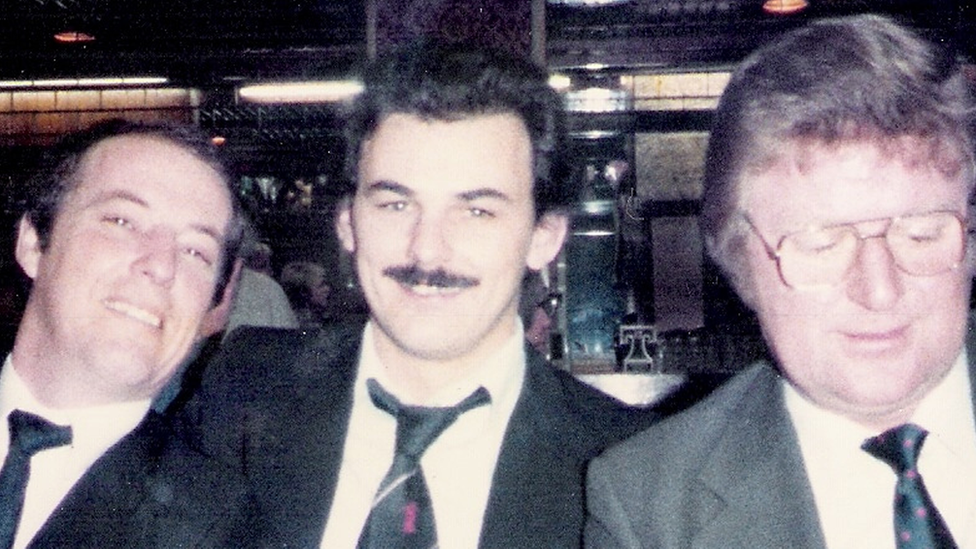
- Published14 March 2016
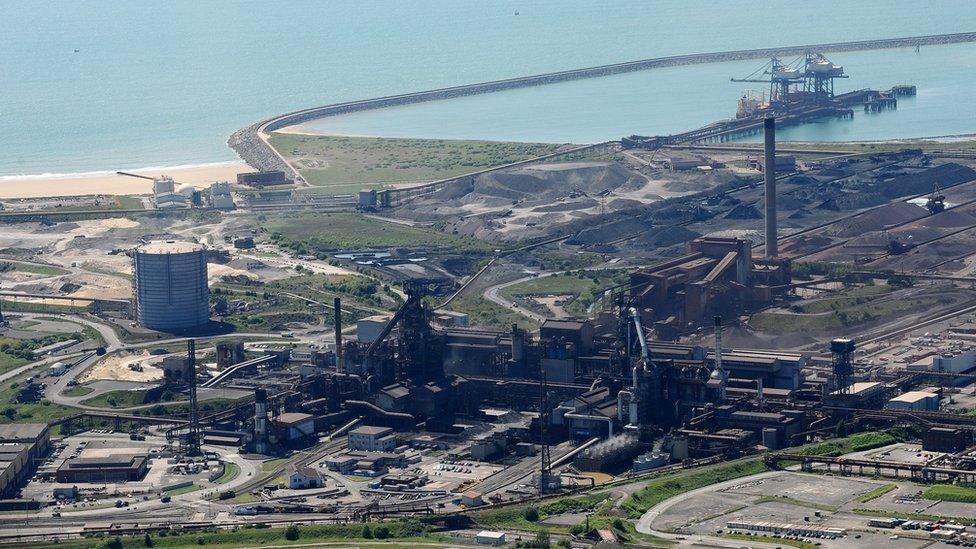
- Published14 March 2016
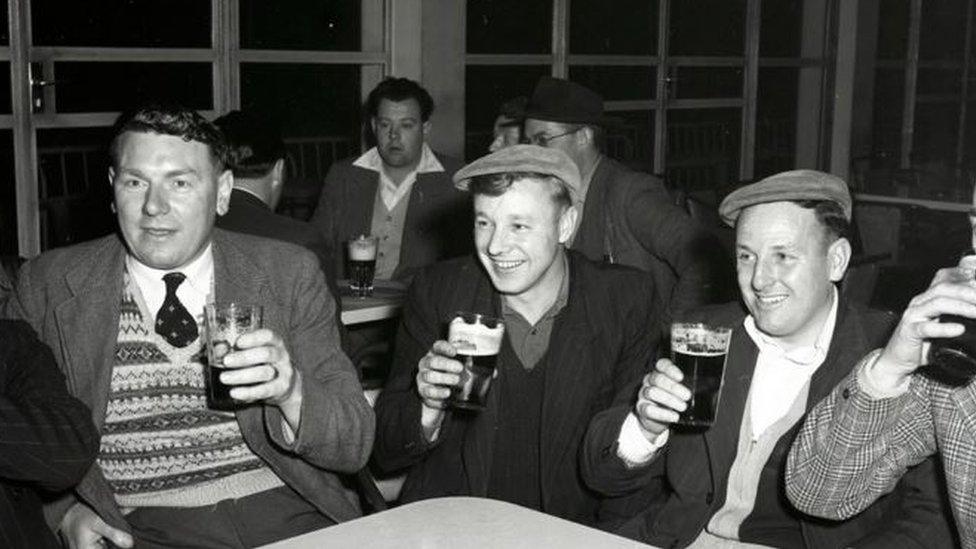
- Published18 January 2016
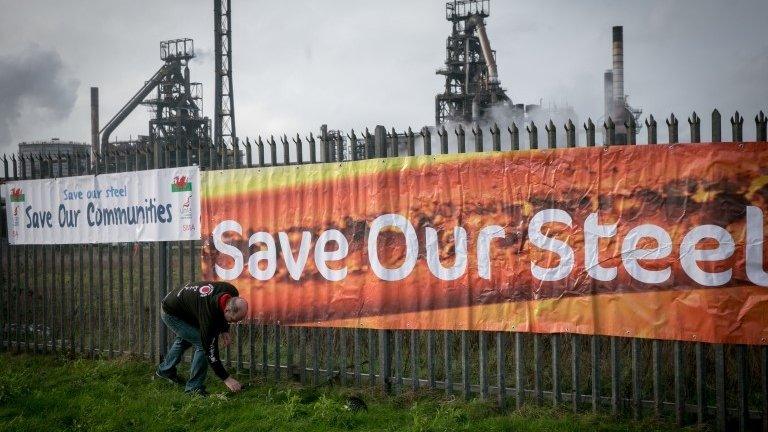
- Published18 January 2016
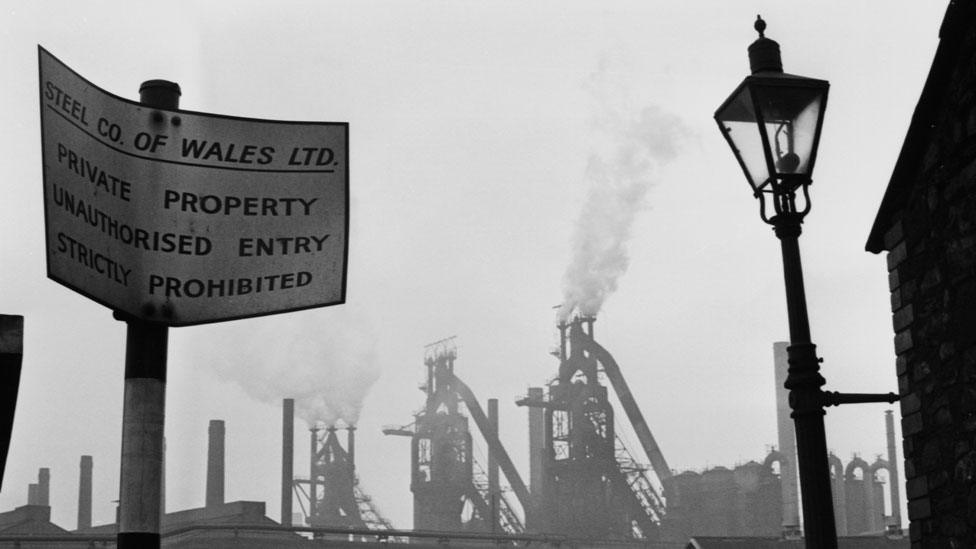
- Published18 January 2016
